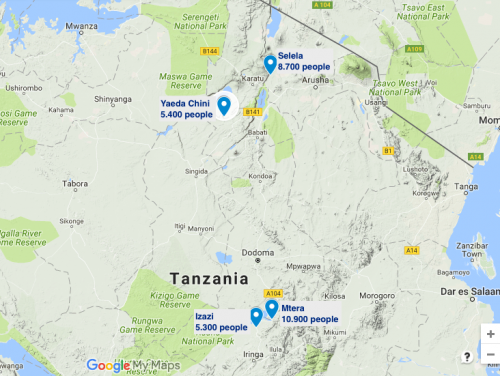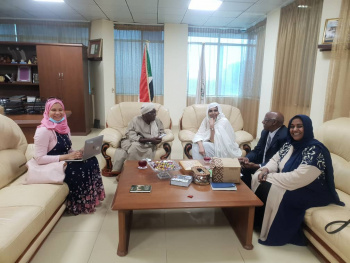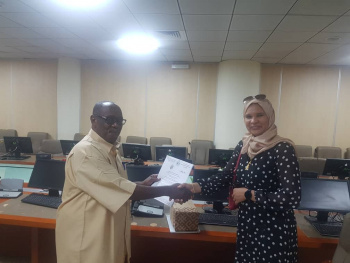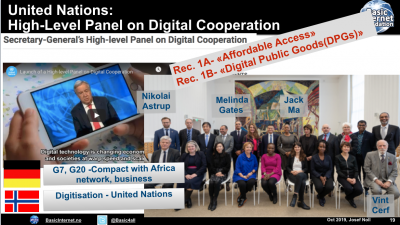DigI:Villages
From its-wiki.no
| Digital Inclusion (DigI) | |||||||
|---|---|---|---|---|---|---|---|
|
DigI Villages
Africa
Tanzania
Our installations in the villages in Tanzania started in March 2019, with Esilalei being the first village in Africa to receive Internet Lite. The other villages/schools/primary health facilities are:
- Esilalei, Arusha District, our first installation, using a solar-powered (120W package) bringing light and connectivity to the community center
- Migoli, Iringa District - connecting the Nyerere High School, and from there the Community Office and the Dispensary,
- Izazi, Iringa, District - see also our Blog on It takes 90 min to connect a village
- Selela, Arusha District - connecting the marketplace to the mobile tower is more than 20 km away
- Patandi Teachers College, outside of Arusha - providing Wifi on the campus and establish an affordable Internet connection
- Kimande, Iringa District to be connected in 2020
- Idodi, Iringa District to be connected in 2020
- (Mungere (Lat -3.3178, Long 35.892)) - who coordinates?
- Mbaash - has potential for 3G connectivity at the dispensary
Connectivity provided by BOACSE
- Chiwanda Secondary School is at Chiwanda village in Nkangamo Ward, Tunduma Township Authority - in collaboration with BOACSE https://plus.codes/RH79+CP (Rashid)
- Chikanamlilo Secondary School in Halmashauri, Momba - in collaboration with BOACSE
Connectivity provided by African Child
- Mkuranga District, in the North-East of Tanzania - in collaboration with African Child at Kiparang'anda and Mwanambaya
- Kiparang'anda: https://plus.codes/R5VG+RC
- Mwanambaya: https://plus.codes/6G4XX62R+82
School connectivity in TZ with UCSAF, TTCL, Vodacom, African Child, Shuledirect, ...
- see: School_Connectivity_TZ for project description
- Musoma tech secondary school: https://plus.codes/FRCJ+GJ
- Morogoro secondary school: https://plus.codes/5MCF+35
- Kigoma grand secondary school: https://plus.codes/F5GC+G5
- Tabora boys secondary school: https://plus.codes/XR57+FR
- Mizengo Pinda secondary school: https://plus.codes/V5R4+RC
- TPC secondary school: https://plus.codes/F8RF+73
Connectivity provided by UDESO Usevya Development Society
- Youth Centre Mpanda - Katavi, connected by the Usevya Development Society (UDESO) in November 2019 https://plus.codes/V6RP+MC
- Usevya village and plans for other 5 sites, Secondary School, Youth Center and Health Center
Connectivity provided by Tanzania Community Networks Association (Matogoro Jabera)
- Kasulu,
- Nyasa,
- Dodoma,
- Kondoa and
- Tarime
Kenya
Collaboration with Africa Higher Education Research Initiative (AHERI) and CISS
- Contacts Robert Owino and Barrack Otieno, Phase 1 with 6 installations in Spring 2020
- Nyalenda Informal Settlement in Obunga in Partnership with KUAP (www.pandipieri.org)
- Obunga Informal settlement in partnership with KUAP (www.pandipieri.org)
- Omuga Technical and Vocational Centre Kabondo Homabay
- CISS Community Centre Akala Gem County Rural www.cisskisumu.org
- CISS Community Centre Ng’iya Rural www.cisskisumu.org
- CISS Community Centre Kisumu County Peri-Urban
Collaboration with the Siaya County
- Siaya County with Library http://www.siayalibrary.org/ (Rotarian John Malamba)
- Connectivity to 8 villages with Siaya Library as a hub
Collaboration with Techbridgeinvest
- Tsunguni village, at a retail shop. It is about 300m from Tsunguni Primary School. It is within Kilifi County near Mombasa City in Kenya. https://plus.codes/5MF9+XM Kaloleni
Congo Brazzaville
Collaboration with Ideal Horizon CIC (Aymar Dimi) on connecting schools and communities, and equip them with infrastructure and connectivity
Democratic Republic of Congo

In collaboration with Core23Lab, we will establish 2 Infospots in April 2021 with Rebecca (through Catherine R. Kimambo)
- As outcome of IGF 2021, we agreed to establish an RCC in Kinshasha with Safe the Climate - still ongoing
- Collaboration with Fadhili from CEAFPD asbl for Uvira, DRC
- Collaboration with Ideal Horizon CIC (Aymar Dimi) on connecting schools and communities, and equip them with infrastructure and connectivity
Ethiopia
As part of the African Innovation Week,
- connected Koye Secondary and Preparatory School
- University of Ambo is our collaboration partner for configuration, (Addisalem_Genta_Gemiya)
Gambia
Through the collaboration with The Gambia House in Norway https://www.gambiahouse.no we connected one school in 2023 and head for the collaboration with the University of Gambia
Ghana
- HOPin Academy, Northern Region of Ghana-Tamale, (MacCarthy Mac-Gbathy) - on hold, waiting for Norec
- StepNetwork (Stephen) on Community Network activities
- GUIFI Africa - (Alfred Baddoo) - connectivity in rural areas in the great Accra region
- Akenten Appiah-Menka University of Skills Training and Entrepreneurial Development (AAMUSTED) as part of SESA project
- Suhut-Atwina (Yayra Glover - Kakao World)
- GIFEC through the Digital Transformation Centres (ITU - DTCs)
Malawi
As part of the SESA project, we are going to install InfoSpots as an integrated part of a renewable energy centre.
Mali
In addition, we have collaborations for connecting other regions:
- Orange & .... on Energy and Communication hot-spot, through (Erwan Le Quentrec)
- Guinea (in collaboration with Orange and Global fund https://www.theglobalfund.org/fr/)
Rwanda
- Connecting 3-5 schools together with Iris Hub (Benjamin)
- CMU Carnegie Mellon University in Kigali, interest for collaboration and connections to the government.
- RFQ for connecting 50 schools in Rwanda by project GIGA
- University of Rwanda - some initial contacts
- EAC Internet Society - contact via Brenda
- Related activities from a High Level Panel Roundtable on connectivity in Rwanda: https://www.un.org/en/pdfs/HLP_Roundtable_1A-Global_Connectivity-Summary.pdf with recommendations:
- Key Stakeholders are invited to submit 3-4 items that they believe can be accomplished in the short-term. From there, the group can seek consensus for the top 2-3 items that will begin to address the existing gaps, recognize affiliated risks and challenges, and take the items forward.
- ITU and UNICEF will develop a 1-pager of the initiatives mentioned in the interventions during the Roundtable, including a summary of the GIGA project, and circulate to the broader group.
- Note: Rwanda is also selected as one of the first 3 countries for school connectivity as part of the UNICEF, ITU and World Bank collaboration on "http://projectconnect.world
- The Africa50 Funda https://www.africa50.com/ has also identified Rwanda as first base for the Innovation Challenge 2020 https://africa50innovationchallenge.com/
Zimbabwe
- Collaboration with Africa University (Gilford_Hapanyengwi) on the educational portal for Universities in Zimbabwe
- Conversion of postal services to become Internet hot-spots
Sierra Leon
- through partnerships with local communities in Sinkunia, Soya, and Bindi area (Trevor Loftin]]
Somalia
- through Jamhuriya University Of Science and Technology (JUST), https://www.just.edu.so and the JTECH centre
South Africa
- through collaboration with Unafundo, and support by the Embassy of the Netherlands
- Discussing with Eric Nitschke from Wakoma Community Networks on an open-source implementation of community platforms
Sudan
Continuing our endeavours Connecting the Unconnected, Basic Internet Foundation, has signed a high-level collaboration agreement with the Sudanese Ministry of Higher Education and Scientific Research aiming to establish complete Digital Inclusion for all Sudanese universities and governmental research institutes through implementing information/wifi spots, building national digital library / academic knowledge portal, centres of excellence for connectivity, and national research and education network in Sudan (NREN).
Wisam had a successful meeting on 11/7/2021, with H.E. Prof. Intsar Sagiron, the Sudanese minister of higher education and scientific research, Prof. Sami, Undersecretary, Mrs. Eshraga Hamza, Director of Cultural Relations Department, Prof. Mohammed Boreen, the University of Gadarif's Dean where they agreed to provide the wifi through the info spot technology for all the public universities and create open access to the educational material. The start will be from the University of Gadarif where they got the set to be implemented in July. The MOU has been signed with Prof. Sami, undersecretary on 29/7/2021 for further collaboration on:
- Digital Inclusion for Universities
- National Digital Library/Academic Knowledge Portal as the base for information for students
- Centre of Excellence for connectivity
- National Research and Education Network
The Foundation has received an overwhelming amount of collaboration invitations where, for now, signed MOUs with seven bodies.
- Ministry of Education and Scientific Research
- University of Gadarif
- University of Dongola
- Sudan Start organization
- Sudan Next Generation
- Bitmakaly National Organization
SAEIYA Association and Social Affairs Office
and three universities for the university collaborations:
- . Nebraska University, USA
- . Dongola University, Sudan
- . Gadarif University,
In our first deployment phase, six partners have got info spots that have been installed and underuse by the local communities, with plans to collaboratively establish all the locally needed content to be part of the spot server (Raspberry Pi)as an offline available material.
All these collaboration agreements will be part of the framework of the distinguished relations between the Kingdom of Norway and Sudan what has been emphasized by the Norwegian Minister of International Development, Dag Inge Ulstein in his meeting with the First Vice-President of the Sudanese Transitional Sovereignty Council, Lieutenant-General Mohamed Hamdan Dagalo on 24th of August 2021.
Connected Universites and Villages
- The University of Gadarif (is a public university in the town of Al Qadarif, capital of the state of Al Qadarif in Sudan. The university is a member of the Federation of the Universities of the Islamic World and the Foundation for Advancement of International Medical Education and Research (FAIMER). DigI:Gadarif_University
- The University of Dongola (in Arabic جامعة دنقلا), is a public university located in Dongola North Sudan. DigI:Dongola_University
- Kebelw village, Kobom, Southern Darfur, West Sudan. To be installed in September 2021 DigI:kebelw_village
Uganda
- Uganda, where we had meetings with UCC, the Internet Society and the Ministry of ICT, see DigI: Way-ahead_Embassy_Norway_Uganda
South-America
Ecuador
In Ecuador we work with Carlos_Rodriguez_Arrieta, Rotary and RAGM on the connectivity of the Pedro Moncayo region, see Rotary_Ecuador_Fair-Basic_Internet-Pedro_Moncayo
Asia
Myanmar
- Collaboration with Zabai on Schools in Myanmar
- in Jan2020 we connected the Thone Htet Monastic School in Yangon. See: Hpa-an@Myanmar for info on the installed equipment
- Agreement with Telenor Myanmar on Wholesale
- on hold, a) focus on Africa, b) own governmental strategy for school connectivity
India
The challenge in India is the one time password (OTP), requiring every new user to authenticate first. This OTP is seen as the main hinder for people without digital knowledge, as it is both a technology hurdle and a knowledge hurdle. Our approach is to promote Internet Lite as a standard without the need for OTP, and/or creating an app to perform the authentication once, and then automatically connect to the InfoSpots.
Through Sudhir Dixit we have an excellent network in India, including
- IIT Indore, India, on Digital Inclusion for Beyond 5G
- IEEE ANTS contributors
You want to know how to establish an Information Spot in your Community? Follow the how to link.
Lessons learned
From the connection of the first villages, we achieved excellent results:
- In each village we find people being highly motivated to support the Internet Lite access
- Communities have taken up the concept, and deploy the information spots
- The cheap deployment using a 6 m pole to reach out even more than 20 km is available everywhere.
Standard poles come in the length of 6 m, which is sufficient for connectivity to reach the mobile network tower being more than 20 km away (case Selela market), or being hidden by the landscape (case Izazi). In addition, the 6 m poles reach up to 2-3 km point-to-multipoint connectivity in rural Tanzania.
In case of larger distances, our solution is to extend to 9 m high poles on the site of the sector antenna (case Migoli), allowing a line-of-site over the top of the trees. In case of the Izazi Dispensary, we used a 9 m pole at the governmental building, and added a 6 m pole at the dispensary.
Connect your village/school/health facility/community centre?
Would you like to get your village, your school, your health facility or the community centre connected? We are collaborating with communities to get the installation done, like the connections performed by African Child or BOACSE. When done, you will have a Wifi spot providing Internet Lite, which is Internet with text and pictures to your people. In addition, you will have a small village server having the possibility of providing information, e.g. Health information as provided to villages in Tanzania.
Watch the 40 s video by Catherine R. Kimambo connecting Kiparang'anda https://vimeo.com/368147538
What we expect from you is to provide the SIM card with 5-10 GB/month, and to perform the installation. We will support you with the information spot. Details on how to provide the solution is found at
- Q&A on Internet Lite for All
- Information on how to establish an Information Spot
- Overview over technology solutions
Achievements, Lessons learned and Recommendations
We would like to thank our collaboration partners in Tanzania. Through the combined effort of the government (Ministry of Health, Universal Communication Service Access Funds (UCSAF), National Institute for Medical Research), Academia (Sokoine University of Agriculture, Muhumbili University), Mobile Operators (especially Tigo and Vodacom), and the communities we achieved our goals of bringing “free access to information for everyone”.
DigI Achievements
After two years of operation, the following was achieved:
- we connected villages which were “impossible to connect” Izazi and Selela, where we extended the 3G network from typically 7-9 km to 22 km (Selela), or reached to a village behind a mountain ridge (Izazi).
- we established an infrastructure costing about € 1000 for the equipment and the configuration.
- we brought free information to schools Migoli: Nyerere High School, Market places Selela market, governmental buildings Izazi and will connect dispensaries Izazi Dispensary and Migoli village centre, in total we connect 10 villages/schools.
- we achieved tremendous positive feedback from the society. Does not matter where, we were welcome and got all the support we wanted. ‘’Everyone recognised the value of free access to information’’.
- We have already three communities (African Child, Bayama Orphanage and Community Services (BOACSE), Usevya Development Society (UDESO)) who picked up the ideas for connectivity, and established rural
- The mobile operators (Tigo and Vodacom) were very helpful in offering fair deals for the pilots, and involved us in their plans.
- National institutions like UCSAF with Justina Mashiba and Albert Richard fully supported us with background information to perform the roll-out.
- our input to the UN High Level Panel on Digital Cooperation is well reflected by the recommendations (especially 1A and 1B) and the mentioning of our work:
- Recommendation 1A: We recommend that by 2030, every adult should have affordable access to digital networks, as well as digitally-enabled financial and health services, as a means to make a substantial contribution to achieving the SDGs…
- Recommendation 1B: We recommend that a broad, multi-stakeholder alliance, involving the UN, create a platform for sharing digital public goods, ….
- Our claim on seeing recommendations 1A and 1B in conjunction, by providing "'free access to digital public goods, is reaching more and more attention.
- On the global scale, we started a discussion on "lightweight digital public goods" and the free access to this lightweight information with actors lite ITU and UNICEF.
- Capacity building is key of “Internet Lite for All”, with a village server with free access to information and apps to download
- Through the "Digital Inclusion" (DigI) project we reached tremendous interest, resulting in both academic presentation, but also invitations to ITU, the African Innovation Week, and other international events. See DigI Publications
And,
- early results from the medical intervention using video and animations to inform the local communities show outstanding results in health knowledge uptake.
Recommendations
Though, there are lot’s of areas still in need to be elaborated
- Adopting the Nordic model of 1 contract with up to 6 SIM cards and a combined data package to create a better base for the information spots,
- A framework for establishing and operating information spots in the villages. In a country being as big as Tanzania, the business model of operators does not allow a coverage of mobile broadband everywhere. Thus, combining mobile network with information spots is an excellent opportunity for digital inclusion, but is currently not addressed in the framework for mobile licenses.
- the distribution of vouchers and the costs for video. Currently, data packages cost 30.000-35.000 TZS for 10 GB data per month. Given that a video of 1 hour typically consumes 1 GB, that means that 1 video costs 3.500 TZS, which is beyond reach for the majority of people. Though, a solution might address sponsorship or social sharing of video content to the local village spot.
- Empower the communities to extend the access to information
- the development of the village platform enabling local communities to contribute to knowledge creation.
- The framework for governmental involvement, i.e. establishing the National Knowledge Portal in each country, by
- transferring the existing information into digital information and
- focus on new business models for free access to information, involving communities and mobile operators.




